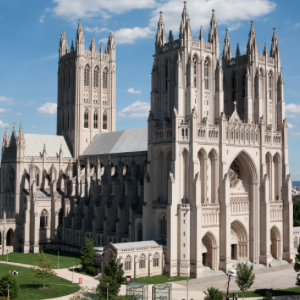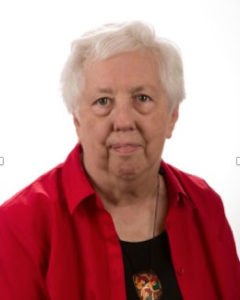
Washington National Cathedral Statement
[Episcopal News Service] It’s not often that an official statement from the Washington National Cathedral – the most famous icon of The Episcopal Church and site of many state funerals and inaugural prayer services – contains words like “savage,” “dangerous,” “violent” and “dehumanizing.”
But it’s also not often that a president of the United States calls an American city “a disgusting, rat and rodent infested mess … a dangerous and filthy place” and targets congressional representatives of color with racist insults.
In light of the escalation of President Donald Trump’s racially focused attacks, the clergy of the National Cathedral released a statement on July 30 that denounced Trump’s “violent, dehumanizing words.” The statement, which has spread rapidly around social media and news outlets, contains some of the strongest, most direct language used so far by American religious leaders in reference to Trump:
“As faith leaders who serve at Washington National Cathedral – the sacred space where America gathers at moments of national significance – we feel compelled to ask: After two years of President Trump’s words and actions, when will Americans have enough?”
The statement, titled “Have We No Decency? A Response to President Trump,” is ultimately directed more at the American people than Trump himself, and draws a parallel between the present moment and Joseph Welch’s famous confrontation of Sen. Joseph McCarthy in 1954.
“As Americans, we have had such moments before, and as a people we have acted. Events of the last week call to mind a similarly dark period in our history,” the statement reads. “McCarthy had free rein to say and do whatever he wished. With unbridled speech, he stoked the fears of an anxious nation with lies; destroyed the careers of countless Americans; and bullied into submissive silence anyone who dared criticize him.”
It took Welch’s bold questioning on national TV – “Have you no sense of decency?” – to “effectively [end] McCarthy’s notorious hold on the nation,” and Trump’s words and actions demand a similar response from the American people, the statement says.
“When does silence become complicity?” it asks. “What will it take for us all to say, with one voice, that we have had enough? The question is less about the president’s sense of decency [than] of ours.”
The statement is signed by the Rt. Rev. Mariann Edgar Budde, bishop of the Diocese of Washington, the Very Rev. Randolph Marshall Hollerith, dean of the cathedral, and the Rev. Canon Kelly Brown Douglas, the cathedral’s canon theologian.
Some of the statement’s firmest language focuses on racism and the erosion of common decency and moral values:
“We have come to accept a level of insult and abuse in political discourse that violates each person’s sacred identity as a child of God. We have come to accept as normal a steady stream of language and accusations coming from the highest office in the land that plays to racist elements in society.”
And although Budde, Hollerith and Douglas have individually criticized various policies of the Trump administration before, this statement’s focus on Trump’s character, its frank description of racism and its warning of violent consequences make it unique:
“Make no mistake about it, words matter. And Mr. Trump’s words are dangerous. These words are more than a ‘dog whistle.’ When such violent dehumanizing words come from the President of the United States, they are a clarion call, and give cover, to white supremacists who consider people of color a sub-human ‘infestation’ in America. They serve as a call to action from those people to keep America great by ridding it of such infestation. Violent words lead to violent actions.”
Joyce D.Sohl: I share this because I too agree that we, as the people, must speak out and against the racism by our government leaders. Enough is enough! Action is required.
Joyce D. Sohl, Laywoman-in-Residence
 Joyce D. Sohl has been Laywoman-in-Residence since 2009 as a full-time volunteer. She retired as CEO of United Methodist Women in 2004. She is the author of 4 books, a teacher, retreat leader, writer and non-professional musician. Here at the Center her work is in the area of Spirituality & the Arts with such programs as Tuesdays in the Chapel, Vespers & All That Jazz, Poet’s Corner, quarterly retreats, and art exhibits.
Joyce D. Sohl has been Laywoman-in-Residence since 2009 as a full-time volunteer. She retired as CEO of United Methodist Women in 2004. She is the author of 4 books, a teacher, retreat leader, writer and non-professional musician. Here at the Center her work is in the area of Spirituality & the Arts with such programs as Tuesdays in the Chapel, Vespers & All That Jazz, Poet’s Corner, quarterly retreats, and art exhibits.
